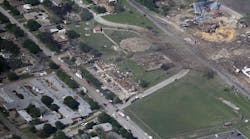Fertilizer Plant Blasts to Bring Closer Scrutiny
Source Tri-City Herald (Kennewick, Wash.)
Dec. 11--Fertilizer retailers in the United States should expect more scrutiny from the federal government in the wake of the April explosion that killed 15 people and injured hundreds in West, Texas, an expert said Tuesday.
David Weeks, a senior partner at Risk Management & Engineering Ltd. of Garland, Texas, spoke to a couple of hundred people at the Far West Agribusiness Association conference at the Pasco Red Lion.
Weeks expects the end of a current exemption where retailers -- unlike fertilizer manufacturers -- do not have to have a safety management plan to cover an unexpected release of chemicals, he said.
Another potential change is adding ammonium nitrate to the list of extremely hazardous substances, even though fertilizer-grade ammonium nitrate typically does not explode, he said.
After the April explosion, the U.S. Chemical Safety Board criticized the U.S. Environmental Protection Agency and the federal Occupational Safety & Health Administration for not including ammonium nitrate on the list of extremely hazardous substances, Weeks said.
Federal officials say ammonium nitrate stored in wooden bins in a wooden building at West Fertilizer Co. exploded during a fire.
The fire started in a seed warehouse and burned for more than 20 minutes before the explosion, Weeks said. Federal and state officials have not determined exactly what started the fire, but have said it could have been short in wiring, a golf car battery short or arson.
Ammonium nitrate is a nitrogen-based fertilizer that has drawn national attention because of the West Fertilizer Co. fire and because it was used in the Oklahoma City bombing in 1995.
However, industry officials say it is not volatile enough to self-ignite. There has to be a fire or a blasting cap to act as a catalyst.
Ammonium nitrate is among the fertilizers manufactured locally.
One of Finley's two fertilizer plants, Agrium, makes ammonium nitrate and other nitrogen-based fertilizers. The other, Tessenderlo Kerley, makes sulfur-based fertilizers out of sulfur from refineries.
A Herald investigation earlier this year found the two fertilizer plants in Finley have had no serious violations, fires or fatalities in the past decade.
They are inspected annually by state officials and conduct internal inspections as well.
About 50 bulk fertilizer licenses have been issued in Benton and Franklin counties to fertilizer manufacturers, bulk fertilizer retailers and farms.
-- To submit business news, go to bit.ly/bizformtch.
-- Kristi Pihl: 582-1512; [email protected]
Copyright 2013 - Tri-City Herald (Kennewick, Wash.)







